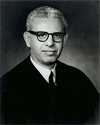Arthur Goldberg

(1908 - 1990)
Arthur Goldberg was an Associate Justice on the U.S. Supreme Court from 1962 to 1965.
Born on the West Side of Chicago in 1908, the last of 11 children of Ukrainian Jewish immigrants, Arthur Goldberg began his life in poverty. Although he rose to high station, including a seat on the Supreme Court, he never placed his personal interests above his duty to public service. His exemplary career was shaped by liberal Jewish social ethics and the experience of poverty he learned as a young boy.
Goldberg's father, Joseph, was a fruit and vegetable peddler who drove a one-eyed horse and wagon through the streets of Chicago. When he died at age 51, eight-year-old Arthur was forced to work. He held jobs as a delivery boy, fish wrapper, shoe salesman and construction worker, all the while excelling at school. While in night school at De Paul University, Goldberg watched Clarence Darrow defend accused murderers Nathan Leopold and Richard Loeb and determined to become an attorney. At age 18 he entered Northwestern Law School, continued to work and yet finished at the top of the class of 1929, just as the Depression struck.
Goldberg accepted a job in a top Chicago law firm, but resigned when he was assigned to foreclose mortgages on other people's property. Championing underdogs, Goldberg opened his own small office and began taking social justice cases. Among Goldberg's clients was the American Newspaper Guild which, in 1938, struck against the Hearst newspapers in Chicago. For eight months, Goldberg represented the strikers without charge, spending countless days in court defending arrested picketers. In the end, Hearst recognized the union. Goldberg became a workingman's hero, eventually serving as general counsel to the Congress of Industrial Organizations (CIO) and the United Steelworkers of America.
In 1955, Goldberg masterminded the legal aspects of the merger between the CIO and the American Federation of Labor (AFL), becoming chief counsel of the newly formed AFL-CIO. A brilliant negotiator and conciliator, he preferred compromise as a way to resolve disputes. Goldberg drew the AFL-CIO into the emerging civil rights movement by filing amicus briefs with the Court in desegregation cases. In 1961, President John F Kennedy appointed him Secretary of Labor, where he was considered among the most energetic members of the Cabinet. Some called him the "Davey Crockett of the New Frontier" and Hubert Humphrey referred to him as the "vitamins" of the Kennedy Administration. A year later, Kennedy nominated Goldberg for a seat on the Supreme Court.
After confirmation, Goldberg provided the fifth liberal vote on the Warren Court. He wrote the Escobedo opinion that preceded Miranda, establishing the constitutional right of a suspect to have a lawyer present during interrogation. He answered critics of the ruling, "if the exercise of constitutional rights will thwart the effectiveness of a system of law enforcement, then there is something very wrong with that system." Goldberg's great theoretical contribution was revivifying the Ninth Amendment, which states that if a right is not enumerated in the Constitution, it is nonetheless retained by the people. He applied this principle in Griswold v. Connecticut, which overturned a law prohibiting married couples from obtaining birth control devices or information. Griswold paved the way for Roe v. Wade and other Court decisions confirming that individuals have a right to be left alone by government.
In 1965, President Lyndon Johnson asked Justice Goldberg to replace Adlai Stevenson, who died suddenly, as United States Ambassador to the United Nations. To the surprise if not shock - of many, Goldberg accepted. Pundits understood Johnson as killing two birds with one stone: filling the UN vacancy while clearing the "Jewish" seat on the Supreme Court for his close friend, Abe Fortas. Less clear is why Goldberg agreed to step down from the Court, which carried life tenure and great prestige. Perhaps Goldberg was bored by the slow pace of the Court. He seems to have believed that he could bring his negotiating skills to the UN to help end the Vietnam War. The only public explanation Goldberg gave was that he could not refuse his president's request. Goldberg became only the fourth Supreme Court justice in this century to resign from active service to take another post, rather than retire.
Of course, Goldberg was frustrated in not being able to end the war. In 1968, when Fortas' nomination to the post of Chief Justice ran into Senate opposition, the lame duck Johnson contemplated nominating Goldberg to the post. He later urged his successor, Richard Nixon, to appoint Goldberg as Chief Justice, a step that the more conservative Nixon never seriously considered.
When Goldberg retired from government in 1968 and became president of the American Jewish Committee, he said, "I'm proud of my Jewish heritage; I don't like any American who's not proud of his heritage." The link between his Judaism and his liberalism appeared particularly at seders, where he retold the story of the Israelites in a way that made their struggles sound like the civil rights struggles of the 1960s. A friend once remarked, "He makes the whole thing the story of all the oppressed and outcast of the world, as if he were presenting a brief before the Supreme Court of History that will forever put Pharaoh in outer darkness."
Goldberg died on January 18, 1990, and was buried in Arlington National Cemetery (he was an officer in the Office of Strategic Services in World War II), near the gravesite of Chief Justice Earl Warren.
Sources: American Jewish Historical Society |